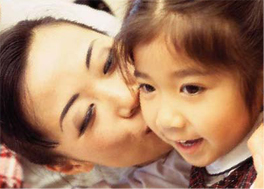Self-esteem is a collection of beliefs that children have about themselves. How they see themselves will greatly influence their motivations, attitudes and behaviours in every situation and towards every person with whom they interact.
Self-esteem has a significant bearing on how well they do in life. Children with healthy self-esteem normally do better in school and are more willing to try new things. They are generally happier and healthier than those with low selfesteem.
Because the foundation of self-esteem is laid early in life, it is important that you play an active role in helping your children develop their self-esteem. Here are some simple ways to start:
- No Comparison
Avoid comparing your children with the neighbour’s children, or their cousins or friends. Doing this does not motivate your child to do better (grow taller or run faster). Instead, you magnify his sense of inadequacy and make him feel that he is a disappointment to you. - Jokes Aside
Do not joke about physical defects, appearance or ethnicity. Reinforce the belief that your child is perfect the way he is regardless of his weight or height and that you love him unconditionally. - No Negative Labels
Do not attribute low levels of competence to your child. Do not label him “slow” or “dumb” if he is unable to do a task. Instead, suggest how he can do it better and offer to help if he needs it. - Avoid Auto-punishment
Avoid automatic punishment. A common example is when children are punished for not finishing their meal, causing them to detest mealtimes. Why not explain mealtime rules to your child and reward him for complying? Discipline should be fair, firm and friendly. - Keep It Positive
The next time you are tempted to say something negative, stop yourself. Harping on your child’s negative aspects (for example, telling all your relatives that he wets his bed every night) leads him to think that it is the only aspect of his personality you are concerned with. - Bid The Bogeyman Bye-bye
Do not frighten your child with ghosts, monsters or the evil policeman. This may work in the short term but may lead to phobias later in life. A child who is constantly threatened with ghosts may develop a fear of dark places and develop a superstitious personality. - Do Not Take Guilt Trips
Do not make your child feel guilty for being “bad” as guilty feelings can lead to chronic worrying, self-blame and even delinquent behaviour in the long run. Always communicate clearly to your child, set reasonable expectations and avoid blaming him if things go wrong. - Create Good Times
Create enjoyable experiences with your child. Fond of fishing? Organise a fishing trip and bring your child along. Including him in your favourite pastime will make him feel important and valued. - Foster Independence
Instead of doing everything for your child, ask him, “How can I support you in what you are trying to do?” Let your child make certain decisions and allow him to make mistakes and learn from them. - Raise Your Praises
Children need praise and positive reinforcement. This helps them believe in themselves and helps them understand that you (and other people) believe in them too.







Comments